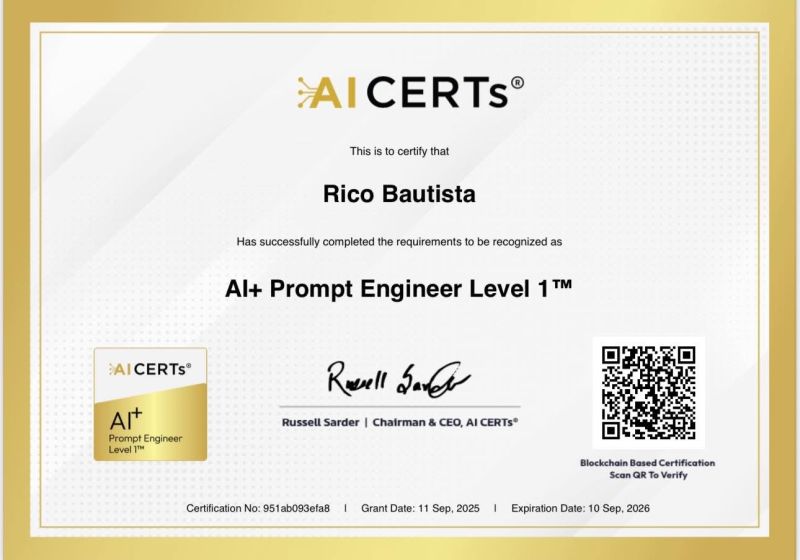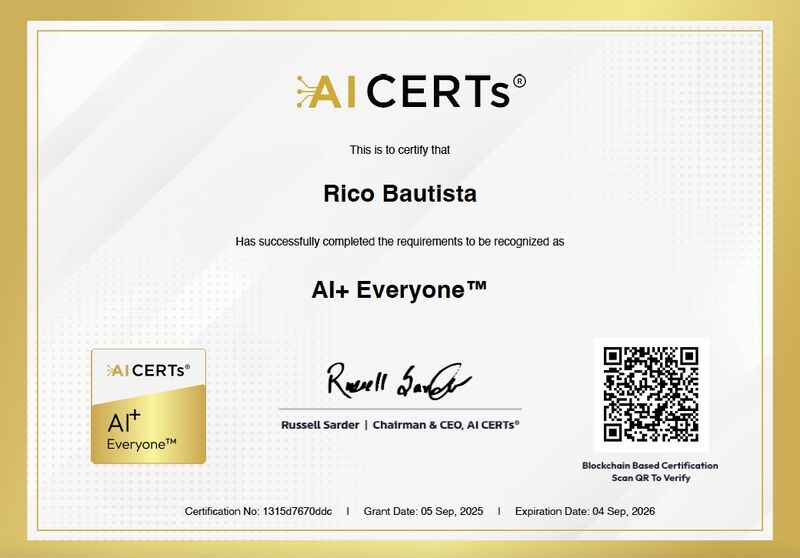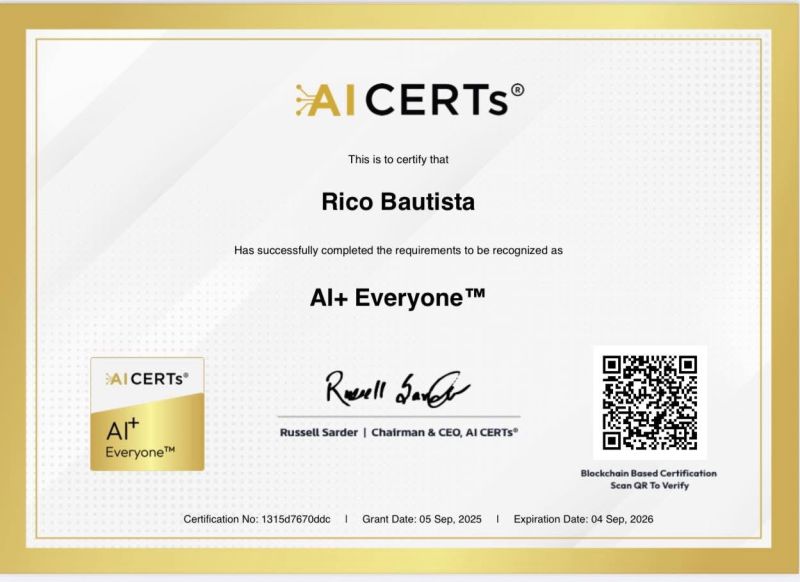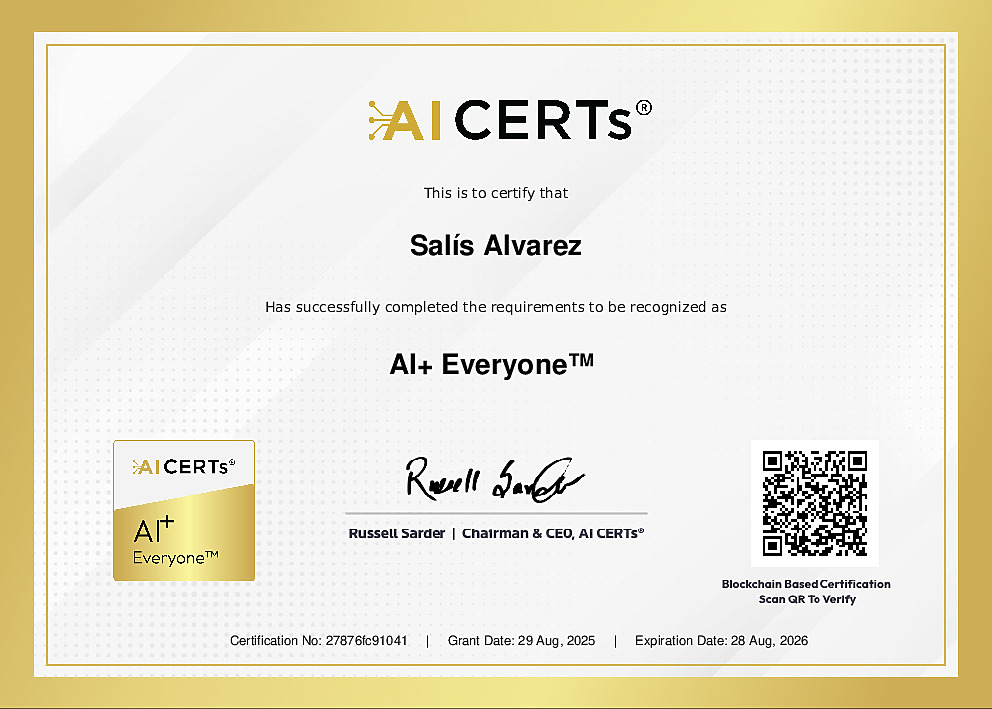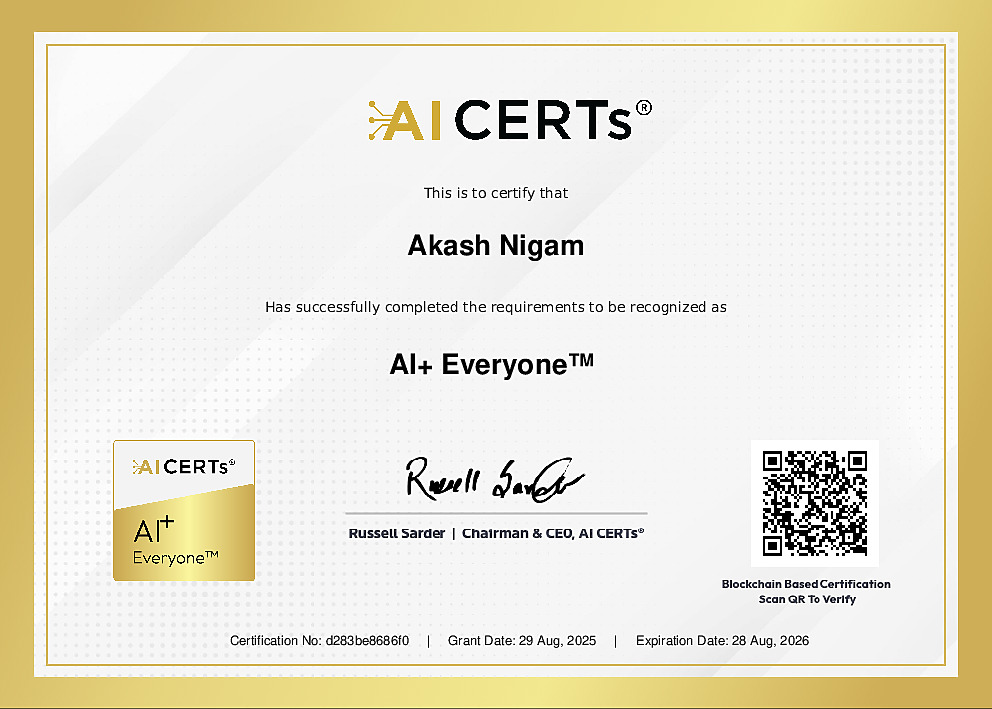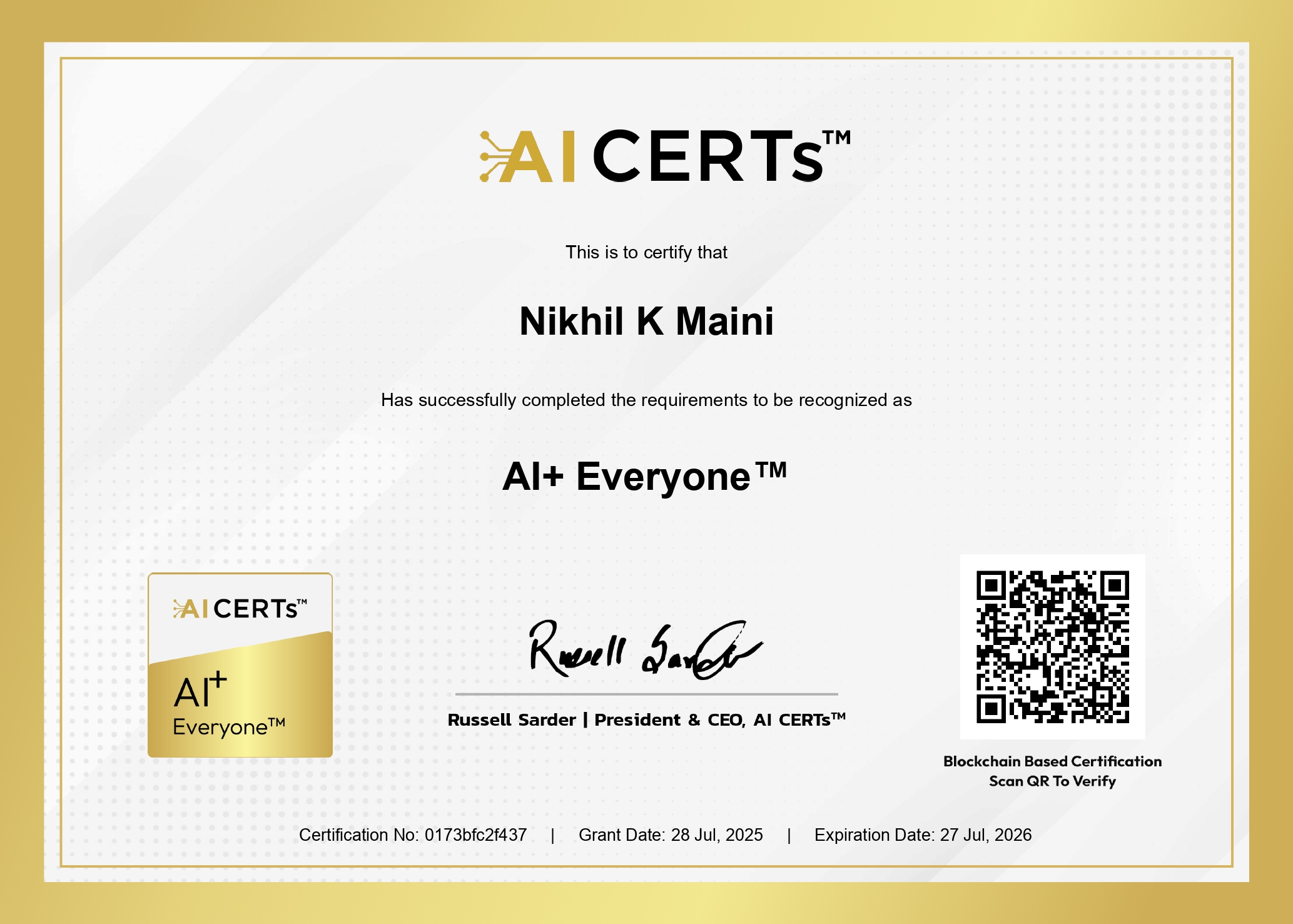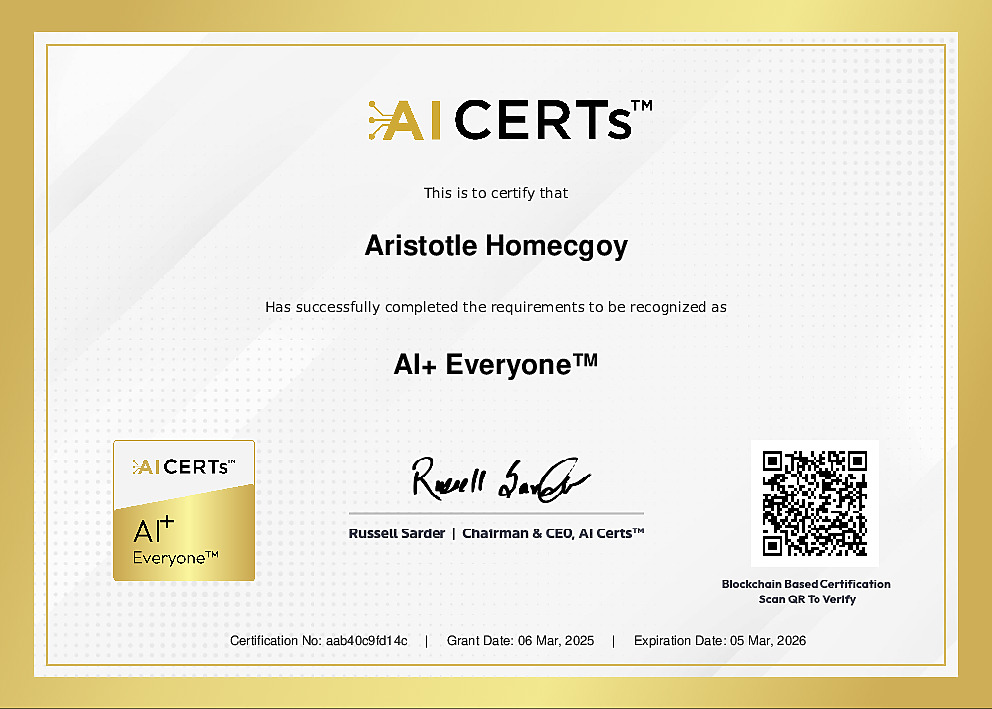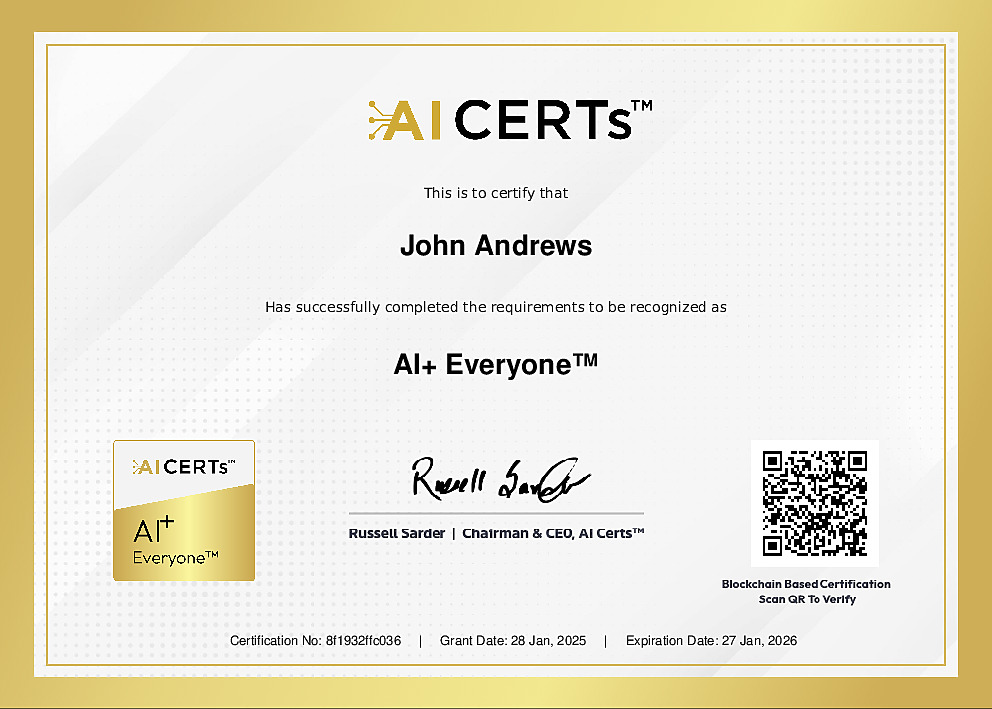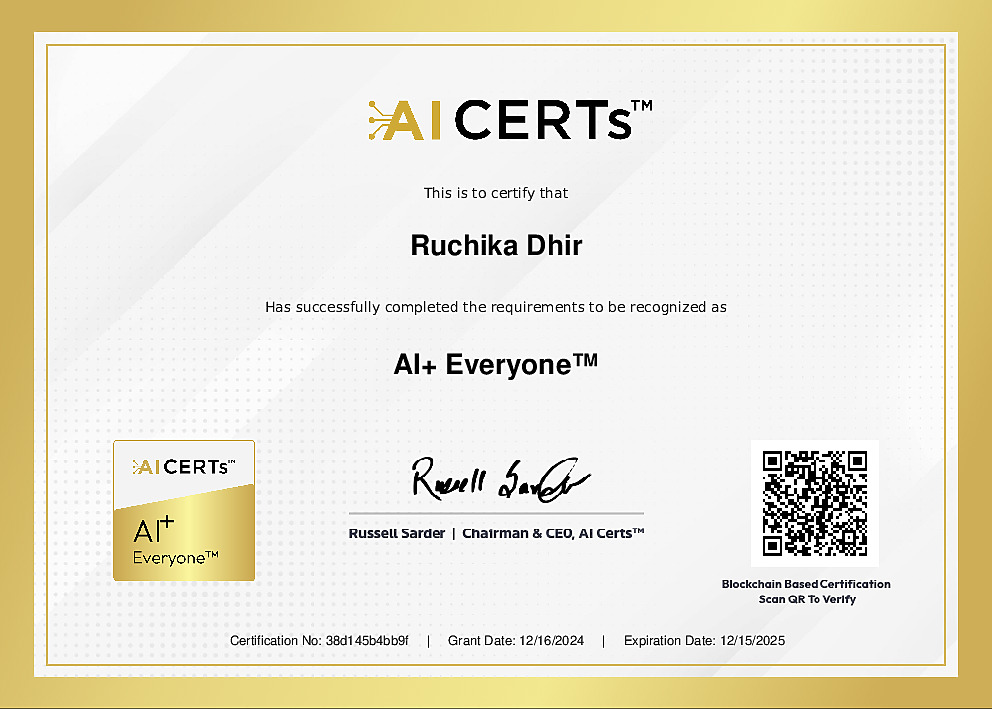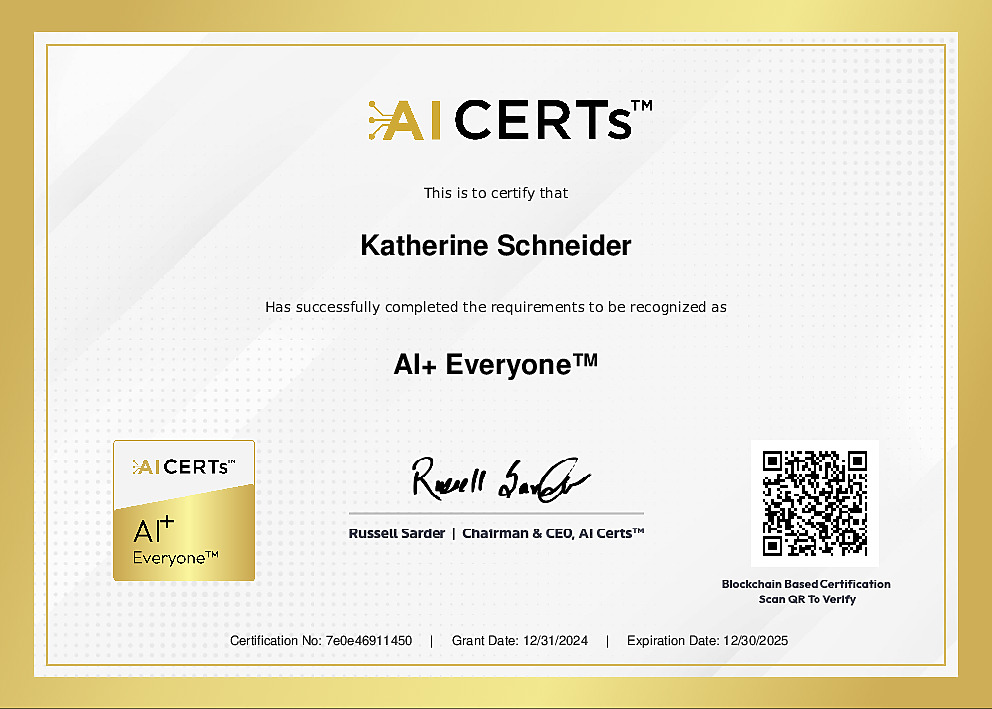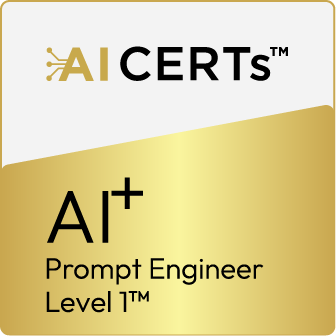AI+ Everyone™
AC-900
Empower Lives with AI: Accessible, Intuitive, Impactful- Beginner-Friendly Course: Ideal starting point for those new to AI, covering core principles and practical insights
- Comprehensive Learning: Covers AI basics, real-world applications, generative AI, and ethical considerations
- Industry & Societal Impact: Gain insights into AI's role in industries and its broader societal influence
- Actionable Guidance: Offers step-by-step resources to kickstart your AI journey and develop essential skills
Why This Certification Matters
At a Glance: Course + Exam Overview
- Instructor-Led: 1 day (live or virtual)
- Self-Paced: 8 hours of content

Who Should Enroll?
Entrepreneurs and Business Leaders: Gain insights into leveraging AI for strategic decision-making and business growth.
Marketing Professionals: Harness AI to optimize campaigns, understand customer behavior, and enhance personalization strategies.
Product Managers: Leverage AI to enhance product development, improve user experience, and create data-driven product strategies.
Consultants & Trainers: Gain expertise in AI to advise clients on technology adoption, process improvement, and digital transformation strategies.
Students & New Graduates: Gain cutting-edge AI skills to stand out in the evolving tech landscape and future-proof your career.
Industry Growth: Democratizing AI Across All Sectors
- 78% of businesses anticipate increasing their use of AI and machine learning in the coming year. (DigitalOcean)
- AI technologies are becoming integral in optimizing business operations, from supply chain management to customer support.
- Companies are increasingly using AI to develop smarter, data-driven products and enhance customer experiences, leading to higher business competitiveness.
- Companies that strategically integrate these technologies into their business models are gaining a significantly competitive edge in the marketplace.

Skills You’ll Gain
- Fundamental AI Principles
- Technological Advancements in AI
- Real-World AI Applications
- AI Project Workflows
- Ethical Considerations in AI
- Generative AI Understanding
- Industry-Specific AI Implications
What You'll Learn
- Course Introduction
- 1.1 What is Artificial Intelligence?
- 1.2 A Brief History of AI
- 1.3 Demystifying AI: Myths vs. Reality
- 1.4 The Significance of AI in Everyday Life
- 2.1 Machine Learning: Basics and Beyond
- 2.2 Deep Learning and Neural Networks
- 2.3 AI Technologies in Action: Simplified Examples
- 2.4 Interactive Workshop: Exploring AI
- 3.1 Introduction to AI Applications
- 3.2 Case Study 1: Smart Speakers
- 3.3 Case Study 2: Self-Driving Cars
- 3.4 Case Study 3: Healthcare Applications
- 4.1 Introduction to AI Project Workflow
- 4.2 Problem Definition and Data Preparation
- 4.3 Model Selection, Training, and Validation
- 4.4 Deployment and Integration
- 4.5 Evaluation and Iteration
- 5.1 Introduction to AI Ethics and Social Implications
- 5.2 Bias and Fairness in AI
- 5.3 Privacy and Security in the Age of AI
- 5.4 Responsible AI Development
- 5.5 AI and Society: Looking Ahead
- 6.1 Introduction to Generative AI
- 6.2 Applications of Generative AI in Creativity
- 6.3 Ethical Considerations in Generative AI
- 6.4 Exploring the Future of Creativity with AI
- 7.1 The Future Landscape of AI
- 7.2 AI and the Transformation of Work
- 7.3 Lifelong Learning in an AI World
- 7.4 Staying Relevant in an AI-Driven World
- 7.5 Interactive Discussion: Preparing for the Future with AI
- 8.1 Introduction to Starting with AI
- 8.2 Choosing AI Projects
- 8.3 Forming AI Teams
- 8.4 Resources for Learning and Development in AI
- 1. Understanding AI Agents
- 2. Case Studies
- 3. Hands-On Practice with AI Agents
Tools You'll Explore

Runway ML

SciPy

AIVA

Grammarly
Prerequisites
- Understand the basics of digital technologies and how they affect life.
- Awareness of ethical principles and societal impact of technology.
- Curiosity and openness to learning about new concepts and technologies.
Exam Details
Duration
90 minutes
Passing Score
70% (35/50)
Format
50 multiple-choice/multiple-response questions
Delivery Method
Online via proctored exam platform (flexible scheduling)
Exam Blueprint:
- Introduction To Artificial Intelligence (AI) – 10%
- AI Technologies – 10%
- AI in Action: Applications And Case Studies – 10%
- The Workflow of AI Projects – 12%
- Ethics And Social Implications Of AI – 15%
- Generative AI And Creativity – 15%
- Preparing For An AI-driven Future – 15%
- Starting With AI: First Steps And Resources – 13%
Choose the Format That Fits Your Schedule
What’s Included (One-Year Subscription + All Updates):
- High-Quality Videos, E-book (PDF & Audio), and Podcasts
- AI Mentor for Personalized Guidance
- Quizzes, Assessments, and Course Resources
- Online Proctored Exam with One Free Retake
- Comprehensive Exam Study Guide
Instructor-Led (Live Virtual/Classroom)
- 1 day of intensive training with live demos
- Real-time Q&A and peer collaboration
- Led by AI Certified Trainers and delivered through Authorized Training Partners
Self-Paced Online
- ~8 hours of on-demand video lessons, e-book, and podcasts
- Learn anywhere, anytime, with modular quizzes to track progress
Discover Your Ideal Role-Based Certifications and Programs!
Not sure which certifications to go for? Take our quick assessment to discover the perfect role-based certifications and programs tailored just for you.
Get CertifiedFrequently Asked Questions
No specific prerequisites are required. The course is designed to be accessible to beginners as well as those with some prior knowledge of AI, offering valuable insights for all levels.
This course is designed for anyone interested in gaining a thorough understanding of AI, regardless of background. Whether you're new to AI or looking to deepen your knowledge, AI+ Everyone™ course provides foundational and advanced concepts essential for navigating today's technological landscape.
You will gain a fundamental understanding of AI concepts, learn about key AI technologies, and explore practical applications of AI in real-world scenarios. You will also understand the ethical considerations and societal impact of AI.
After completing the course, you will have access to further learning materials, case studies, and resources that will help you continue exploring AI topics and keep up-to-date with AI advancements.
Participants will gain foundational AI knowledge that will help them understand the key technologies, applications, and challenges of AI. This course will empower them to begin applying AI concepts in personal or professional contexts and make informed decisions about AI implementation.






